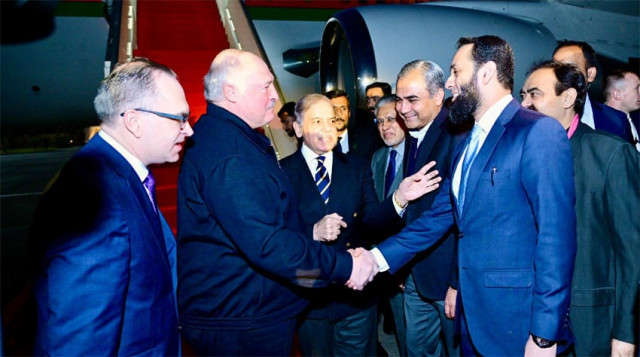Trade corridor with Belarus top priority
Ministers aim to unlock potential by establishing direct flights, trade corridors

Following the launch of direct flights to Azerbaijan, Pakistan is now working to establish direct flights to Moscow and Belarus, while the development of trade corridors to China, Afghanistan, Central Asia, and Belarus remains a top priority for the country.
Federal Minister for Communications, Privatisation and Board of Investment Abdul Aleem Khan expressed these views while holding a joint meeting with Belarusian Minister for Transport Alexei Lyakhnovich. Senior officials of the communication sector of both countries participated also in the talks, according to a press statement released on Monday.
Lyakhnovich, accompanying the delegation led by the Belarusian president, invited the communications minister to visit his country and said that his country wants to increase connectivity with Pakistan through railways and roads. Now, cross-border trade is key to strengthening the country's economy and promoting bilateral relations, he added.
Abdul Aleem Khan highlighted the significance of the 68-member Belarusian delegation's visit, terming it a pivotal moment in enhancing government-to-government (G2G) and business-to-business (B2B) engagements. "Like Azerbaijan and Turkey, Pakistan seeks to make Belarus a strategic investment partner by leveraging its natural resources and skilled workforce," he said. Khan added that trade corridors modelled on the Karakoram Highway and CPEC could bolster regional trade. Discussions also addressed delays in Pakistan's motorway and highway projects, with both sides agreeing to expedite pending initiatives. The forum reiterated the importance of collaboration in infrastructure and transportation to realise shared economic goals.
Speaking at the Pakistan-Belarus Business Forum, Federal Minister for Commerce Jam Kamal Khan noted that the current trade volume between the two countries fails to reflect their economic potential. He urged the need for trade diversification and reduction of tariff and non-tariff barriers to unlock growth opportunities. "There is immense potential for collaboration in sectors such as food, pharmaceuticals, textiles, leather, logistics, and energy," he stated.
During the forum, eight B2B Memorandums of Understanding (MoUs) were signed, signalling progress in bilateral trade. The event was co-chaired by Kamal Khan and Belarusian Minister of Energy Aleksei Kushnarenko, who underscored the complementarity of the two economies.
Kushnarenko expressed optimism, saying, "I am confident these engagements will significantly boost bilateral trade and diversify our trade portfolios. I also anticipate that during discussions and B2B meetings, both sides will thoroughly explore areas of cooperation, devise practical solutions to current challenges, and outline a clear path forward for enhancing trade, investment, and connectivity."
Highlighting Pakistan's market potential, he remarked, "With a population of 250 million, Pakistan is the sixth-largest market globally. Our economy, rich in natural and industrial resources, offers immense opportunities for growth and development."
"Pakistani meat, dairy, agricultural, and industrial products have significant export potential to Belarus, while Belarus's agricultural machinery and petrochemical products are sought-after in Pakistan," Kushnarenko noted.
Kamal Khan reaffirmed Pakistan's commitment to boosting regional trade and connectivity, aiming to position the country as a trade and transit hub. He highlighted the 2025-27 Roadmap for Comprehensive Cooperation with Belarus, focusing on advancing electronic collaboration and regional ties under the Shanghai Cooperation Organisation (SCO).
Meanwhile, Minister for industries and Production Rana Tanveer Hussian met with a Belarusian delegation led by its Minister for Industries Aliaksandr Yafimua.
Hussain called for strengthening industrial ties with Belarus, particularly in agriculture and manufacturing. He highlighted Pakistan's export potential in products like inflatable footballs, sports equipment, and agricultural machinery. Belarusian delegates expressed interest in establishing joint ventures (JVs) in tractor manufacturing, electric vehicles (EVs), and agricultural productivity enhancement. WITH ADDITIONAL INPUT FROM APP



















COMMENTS
Comments are moderated and generally will be posted if they are on-topic and not abusive.
For more information, please see our Comments FAQ